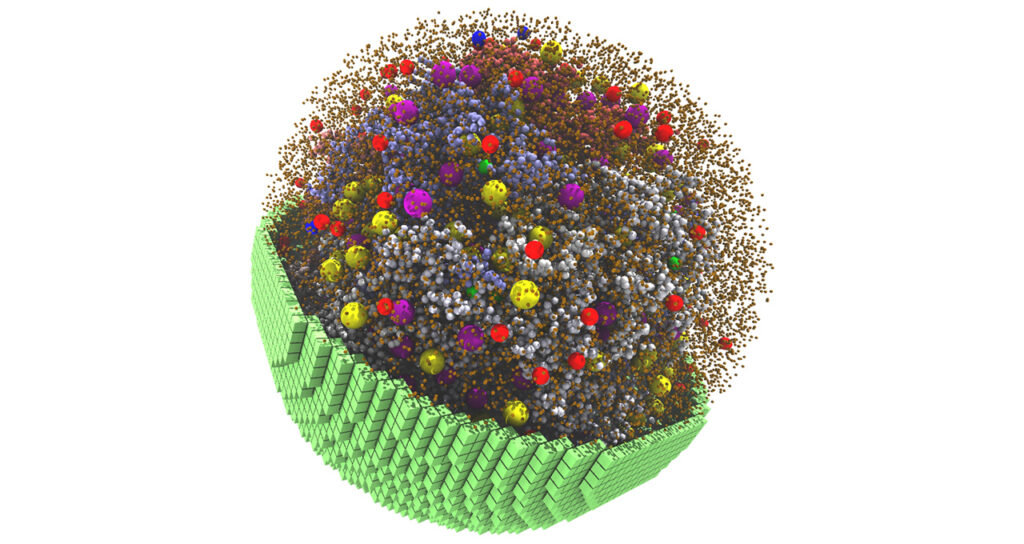Remember the famous movie The Prestige (2006), whose plot involved a cloning machine that duplicated living organisms, and the movie The Island (2005), where a facility existed for cloning naïve humans to provide organs and perfect bodies for the wealthy. All this sounds too far-fetched and pure science fiction for now. Not anymore. Through stupendous advancements in artificial intelligence (AI), scientists and researchers are working to create the world’s first virtual cell.
A virtual cell is nothing but a super-detailed, computer-generated version of a real living cell. As and when virtual cells get created, they will have a huge impact on reducing many existing ethical dilemmas, accelerating personalized medicine, revolutionizing drug testing, and paving the way for future breakthroughs.

We all know that cells are biological in nature, and so far, there is no way to create a cell through non-biological means. It seems that all this is going to change very fast. It has been prophesied that when a cell becomes programmable, so will the entire field of biology. It would be akin to simulating life down to a molecular scale. It all sounds pretty unrealistic right now, but the frantic pace of developments taking place is likely to make this a reality in the next couple of years.
Its implications would be profound and far-reaching. Virtual cells have tremendous potential to act like digital twins of real cells. It would become so much easier for scientists to conduct experiments and test ideas on a virtual cell rather than on a real cell.
There is another very interesting aspect to it that most people are not talking about: cloning. Cells are the building blocks of life. So, through virtual cells, before cloning a real organism or growing tissues, scientists could use virtual cells to simulate the process. This is like using a flight simulator to practice flying without risking a plane. This would drastically reduce trial and error in the lab, saving time, money, and animals.
Also, cloning often fails today because of unpredictable cell behaviour. Virtual cells could help optimize this process by identifying the best conditions to nurture a clone. Similarly, the ethical concerns relating to cloning would be alleviated to a large extent, since simulating virtual cells involves no real-world risks.
Thus, as the dream of virtual cells edges closer to reality, the possibilities seem boundless. We will soon usher in an era where simulating life at the atomic level becomes routine. I just hope that the future does not turn out to be dystopian like the movie Ex Machina (2014) and Blade Runner (1982). 😀


Hey 🙂 Just between, are some totally uncorelated websites
blogs to ours, however, they are ultimate worth checking order out..
I was recommended this blog by my cousin. I’m no longer sure whether this publish is
written by means of him as no one else recognise
such designated about my difficulty. You are wonderful! Thanks!
my web-site OnebetAsia Togel Bali
Thank you! 🙂
thanks, great to find some folks putting efforts in their writing still.
agree with everybody else.
Thank you for the kind words. 🙂
Hi there outstanding blog! Does running a blog like this take a lot of work?
I have no expertise in programming but I had been hoping to
start my own blog soon. Anyways, should you have any recommendations or tips for new blog
owners please share. I understand this is off topic nevertheless I just wanted to ask.
Thanks!
Also visit my web site – ruay. org เข้าสู่ระบบ
Thanks for the compliment. Actually, it does not take much effort to start a blog. Only the initial effort of setting up the blog page takes few hours. After that, it is all up to you as to how much you want to write.
Thanks for sharing your thoughts about huay. Regards
Here is my web blog; ซื้อหวยออนไลน์ถูกกฎหมาย
Hello to all, the contents present at this website are in fact amazing for
people experience, well, keep up the nice work fellows.
Thank you for the kind words. 🙂